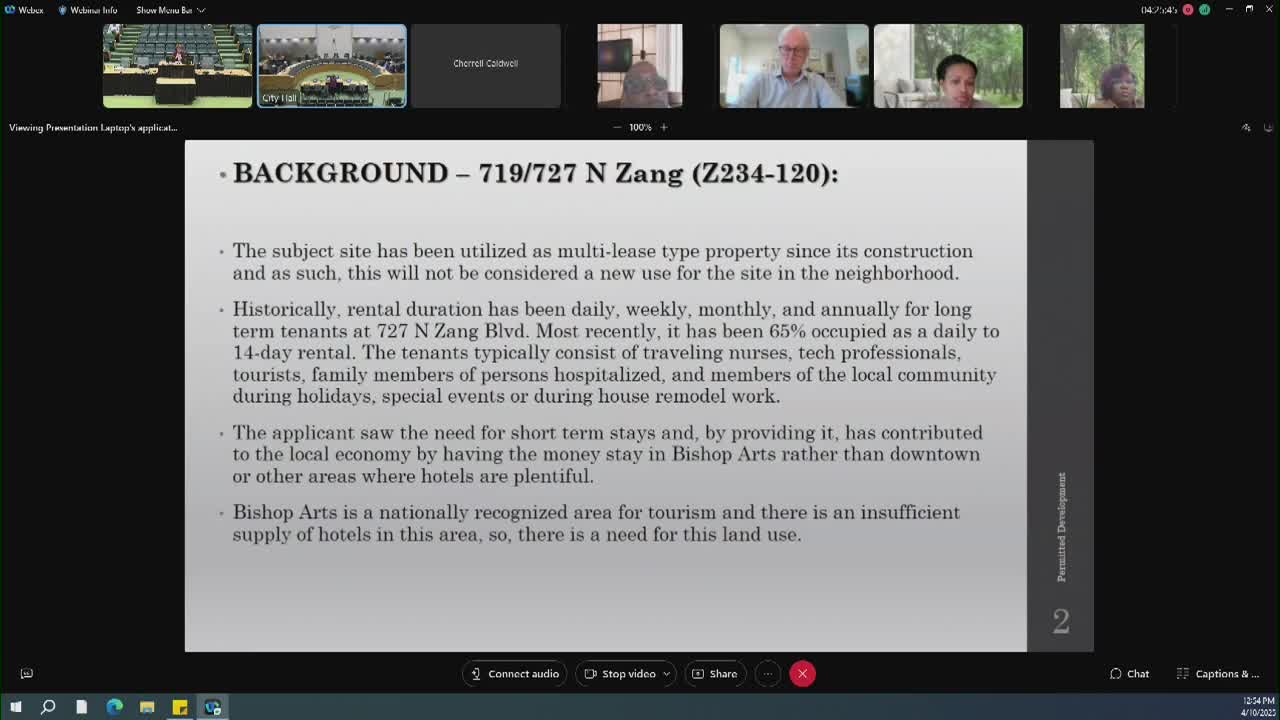Planning commission approves short-term 'boutique hotel' subdistricts in Oak Cliff and Bishop Arts with four-year SUPs
Get AI-powered insights, summaries, and transcripts
Subscribe
Summary
The Dallas City Planning Commission approved new PD subdistricts and four-year specific-use permits allowing boutique-hotel conversions at two Oak Cliff properties, drawing opposition from Kid Springs residents who said the changes would convert long-term housing and rewrite land-use rules.
The Dallas City Planning Commission voted Thursday to allow boutique-hotel uses by specific-use permit in two Oak Cliff properties, approving four-year SUPs and new planned-district subdistricts that will let two existing multifamily buildings operate as boutique hotels.
The action approved a PD subdistrict within PD 468 for a property at 272 and 727 Zang Boulevard (the former Barto Lofts) and a separate PD subdistrict within PD 830 for 620 North Bishop Avenue. Both approvals allow kitchens inside guest rooms, permit external entry to rooms and require a site plan and conditions tied to a four-year SUP, according to staff and applicants. The commission also added a condition requiring a scannable QR code on the building that links to customer support contact information, a measure backers said would make it easier for neighbors to report problems.
Supporters — including the applicants’ representatives — told the commission the properties already rent by the day and week and serve visitors to the nearby Bishop Arts retail and restaurant district. “This property has been used as a multi lease property since its construction. Historically, this has been a daily, weekly, monthly, and annually, tenant rental. As of late, it has been as much as 65% occupied as daily to 14 day rental,” attorney Audra Buckleif told the commission about one site. Vice Chair Reuben, who moved approval, said the SUP approach balances neighborhood concerns and the market reality that Bishop Arts draws tourists and out-of-town visitors.
Opponents argued the approvals would shrink the local long-term rental stock and undermine neighborhood plans. Rob Shearer, vice president of the Kid Springs Neighborhood Association, called the measure a “clear attempt to carve out a loophole” and said conversions reduce housing available for residents: “Every apartment that becomes a short term rental is 1 fewer home for a Dallas resident.” Other residents said the properties were built and permitted as multifamily and should remain primarily for long-term occupancy.
Staff emphasized that the PD amendments are required before an SUP can be issued and that the SUPs create enforceable, time-limited conditions. The commission’s approvals are subject to the site plans and conditions read into the record; the SUPs will return to the commission if conditions are violated or for re-evaluation at the end of the four‑year term.
The commission recorded motions to approve each subdistrict and SUP. The bodies’ votes and the specific site-plan conditions are captured in the official minutes and will be part of the ordinance language forwarded to council for final action.
The decisions do not change citywide rules for short‑term rentals or overnight lodging; they establish a narrowly drawn subdistrict-and‑SUP pathway for the two properties. The commissions’ approvals give neighbors oversight tools — an SUP can be reopened and reconsidered by the commission if complaints about operations, safety or code compliance arise during the permit period.
Plans for guest-room kitchens, external entries for all rooms, and the QR-code requirement are among the details neighbors requested be tied to the approvals. The commission’s motion added language extending allowable rental duration in the new subdistricts to allow rentals on a daily, weekly or monthly basis rather than limiting stays to 14 consecutive days.
